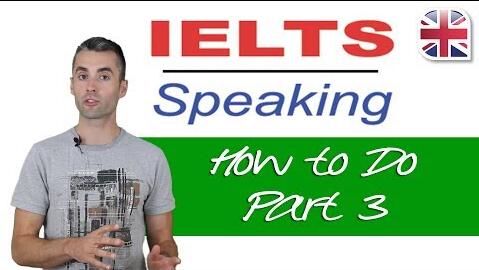For example, the examiner asks you: "Do you think that children do less sport and exercise than in the past?"
例如,考官问你:“你认为孩子们做的运动和锻炼比过去少吗?”
You could say: "I really have no idea.
你可以说:“我真的不知道。”
I don't have children, and none of my friends do either.
我没有孩子,身边的朋友也都没有。
I'm afraid it's just not a topic I can say much about." Be careful: you shouldn't do this unless it's absolutely necessary.
恐怕这个话题我表达不了太多的内容。“要注意:若非必要,别轻易这样作答。
You also need to give a reason why you don't have anything to say.
你还需要解释为什么你无话可说。
You need to make it clear to the examiner that it's not just your English skills which are stopping you from giving a full answer.
你需要让考官明白,不只是你的英语水平阻碍了你给出完整的答案。

Secondly, if you do this, you can only really do it once. You can't do it in too many questions.
其次,如果要这么做,只能使用一次。别在其他的问题里使用了。
Finally, even if you do this, you should still try to speculate.
最后,即使这样做了,也应该试着去设想。
For example: "I really have no idea.
例如:“我真的不太了解。
I don't have children, and none of my friends do either.
我没有小孩,身边的朋友也都没有。
I'm afraid it's just not a topic I can say much about.
恐怕我对这一话题表达不了太多的见解。
Suppose that...I suppose that children might be less active than in the past,
我认为孩子们可能没有过去那么活跃了,
because they spend more time online and playing video games and things like that."
因为他们花了更多的时间上网和玩电子游戏等等。”
You need to put thought into your answer, and try to add details, even if your answer is basically “I don't know."
你需要思考自己的答案,并试着补充细节,即使你给的答案基本上是“我不知道”。
Otherwise, it could affect your IELTS score.
否则的话,会影响你的雅思成绩。
However, this can save you if you get a question which you really don't know how to answer.
然而,遇到一个自己不熟悉的问题时,这个办法能够救场。
It won't affect your score if you make your reasons clear, and if you put some thought into your answer.
如果你把理由交代得很清楚,并且在答案中加入了一些想法,这就不会影响你的分数。
The examiner wants you to speak.
考官希望你开口表达。
By saying something like this to the examiner, you're saying, “I can't say much about this, so give me a different question or topic."
用这样的方式跟考官交流,“关于这个问题我表达不了太多,所以可否换个问题或者话题。”
Being honest like this is much better than trying to answer the question when you have no idea what to say.
比起不知道该说什么仍要硬着头皮回答,诚实反而更有利。
Just remember, this is something you can only use if it's really necessary.
请记住,这只是在必要时使用的技巧。
Okay, our last point: Part six: interact with the examiner.
好的,最后一点:第六部分:与考官互动。
Part three of the IELTS speaking test is different,
雅思口语考试的第三部分是不同的,
because it's the first time in the speaking exam that the examiner can actually talk to you.
因为这是口语考试中考官第一次真实地跟你对话。
In parts one and two, the examiner is reading a script.
在第一部分和第二部分,考官只是在读稿子。
He or she has very little freedom to respond to what you say.
他或她很少有机会能回应你说的内容。
However, part three is different.
但是,第三部分就不一样了。
The examiner can respond to what you say, and take part in the conversation more.
考官可以回复你所答的内容,能更多的参与到对话中来。
What does this mean for you?
这对大家来说意味着什么呢?
During part three of the IELTS speaking exam, you need to listen to what the examiner says,
在雅思口语考试第三部分,你需要听考官说什么,
and think about what he or she wants you to do.
并且思考他或者她希望你怎么做。
For example: Is the examiner responding to something you said, or asking a new question?
例如,考官是在回答你的问题,还是在询问一个新的问题?
Is the examiner asking for more details about something you said?
考官是在问关于答案的更多细节吗?
Is the examiner asking you to give your opinion, or respond to a different opinion?
考官是让你给出自己的观点,还是对不同的观点做出回应?
This also means that you shouldn't expect to just speak for as long as you want.
这也意味着,你不可以想聊多久就聊多久。
The examiner can—and will—jump into the conversation to ask extra questions, or to change the direction a little bit.
考官可以并且也会参与到对话中询问其他的问题,或者稍微转变一下对话的方向。
You need to be flexible in part three.
在第三部分中,你需要灵活应对。
In parts one and two, you're given questions and you can answer without being interrupted, you can say what you want.
在第一部分和第二部分中,考官会给出问题,作答时没有人打断,你可以畅所欲言。
In part three, you need to interact with the examiner.
在第三部分中,你需要与考官互动。
It should be more like a natural conversation, rather than a question-answer format.
这部分更像是一个自然的对话,而不是一问一答的形式。
Okay, that's the end of the lesson on part three.
好了,这就是第三部分的所有内容了。
I hope all this IELTS advice was useful.
希望所有的雅思考试建议都是有帮助的。
If you've watched all of our videos on the IELTS speaking exam,
如果大家看过我们所有关于雅思口语考试的视频,
you should now have a good idea of what to expect and what to do in the IELTS speaking test.
那么应该对在雅思口语考试中应做事项和可做事项有了一个很全面的了解。
Good luck if you have an exam coming up!
祝参加考试的考生好运!
Remember also you can see more of our free lessons on our website: Oxford Online English dot com.
还有,大家可以到我们网站上查看更多的免费课程:Oxford Online English dot com。
But for today, thanks very much for watching, see you next time!


